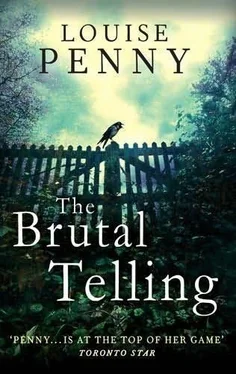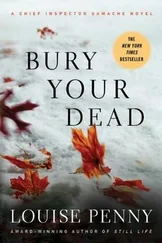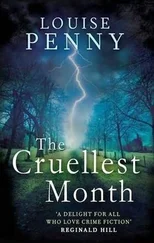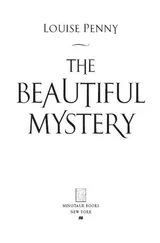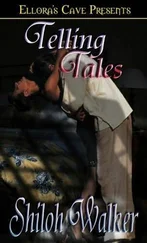“How did you know?”
“The place of wonders. Ninstints on the Queen Charlotte Islands. The totem poles told me.”
“They told you?”
“In their way. Each image built on the last. Each told its own story and was a wonder unto itself. But when taken as a whole they told a larger story.”
Beauvoir, listening to this, thought about Ruth’s couplets. The Chief had told him they did the same thing. If put together, in the right order, they too would tell a story. His hand slipped into his pocket and touched the scrap of paper shoved under his door that morning.
“What story do these tell, Olivier?” Gamache repeated. It had actually come to him on the plane as he’d listened to the little boy and the intricate GI Joe world he created. He’d thought about the case, thought about the Haida, the Watchman. Who, driven by his conscience, had finally found peace. In the wilderness.
The Chief Inspector suspected the same thing had happened to the Hermit. He’d gone into the forest a greedy man, to hide. But he’d been found. Years ago. By himself. And so he used his money as insulation and toilet paper. He used his first editions for knowledge and companionship. He used his antiquities as everyday dishes.
And in that wilderness he found freedom and happiness. And peace.
But something still eluded him. Or, perhaps more to the point, something still clung to him. He’d unburdened himself of the “things” of his life, but one more burden remained. The truth.
And so he decided to tell it to someone. Olivier. But he couldn’t go quite that far. Instead, he hid the truth in a fable, an allegory.
“He made me promise never to tell.” Olivier had dropped his head and spoke into his lap.
“And you didn’t. Not while he was alive. But you need to tell now.”
Without another word Olivier reached out and moved the photographs about, hesitating briefly over a couple, switching the order at least once. Until finally, spread in front of them, was the Hermit’s story.
And then Olivier told them, placing his hand over each image as he spoke. And as Olivier’s soft, almost hypnotic voice filled the space between them Gamache could see the dead man, alive again. In his cabin late at night. His one visitor sitting across the flickering fireplace. Listening, to this tale of hubris, of punishment and love. And betrayal.
Gamache watched as the villagers, happy in their ignorance, left their homes. And the young man raced ahead, clutching his small package, encouraging them to hurry. Toward paradise, they thought. But the boy knew differently. He’d stolen the Mountain’s treasure.
And worse.
He’d stolen the Mountain’s trust.
Now each figure the Hermit had carved took on a significance. The men and women waiting by the shore, having run out of land. And the boy, cowering, having run out of hope.
Then the ship arrived, sent by gods jealous of the Mountain.
But behind was the ever-present shadow. And the threat of something unseen but very real. The ghastly army, assembled by the Mountain. Made up of Fury and Vengeance, promising catastrophe. Fueled by Rage. And behind them the Mountain itself. That couldn’t be stopped and wouldn’t be denied.
It would find all the villagers and it would find the young man. And it would find the treasure he’d stolen.
As this army pressed forward it provoked wars and famine, floods and plagues. It laid waste to the world. Chaos led the army and chaos was left behind.
Beauvoir listened to this. His hand in his pocket scrunched Ruth’s latest couplet and he could feel it damp with sweat. He looked down at the photos of the carvings and saw the happy, ignorant villagers slowly transformed as they too first sensed something approaching, then knew it.
And he shared their horror.
Finally the wars and famine arrived on the shores of the New World. For years the wars raged around their new home, not quite touching it. But then . . .
They all looked at the final image. Of the villagers bunched together. Emaciated, their clothing in tatters. Looking up. In terror.
At them.
Olivier’s voice stopped. The story stopped.
“Go on,” whispered Gamache.
“That’s it.”
“What about the boy?” asked Gabri. “He’s not in the carvings anymore. Where’d he go?”
“He buried himself in the forest, knowing the Mountain would find the villagers.”
“He betrayed them too? His own family? His friends?” asked Beauvoir.
Olivier nodded. “But there was something else.”
“What?”
“Something was behind the Mountain. Something driving it on. Something that terrified even the Mountain.”
“Worse than Chaos? Worse than death?” asked Gabri.
“Worse than anything.”
“What was it?” Gamache asked.
“I don’t know. The Hermit died before we got that far. But I think he carved it.”
“What do you mean?” asked Beauvoir.
“There was something in a canvas sack that he never showed me. But he saw me looking at it. I couldn’t help myself. He’d laugh and say one day he’d show it to me.”
“And when you found the Hermit dead?” asked Gamache.
“It was gone.”
“Why didn’t you tell us this before?” snapped Beauvoir.
“Because then I’d have to admit everything. That I knew him, that I’d taken the carvings and sold them. It was his way of ensuring I’d come back, you know. Parceling out bits of his treasure.”
“A pusher to an addict,” said Gabri, with no rancor, but with no surprise either.
“Like Sheherazade.”
Everyone turned to Gamache.
“Who?” Gabri asked.
“It’s an opera, by Rimsky-Korsakov. It tells the story of the Thousand and One Nights.”
They looked blank.
“The king would take a wife at night and kill her in the morning,” said the Chief Inspector. “One night he chose Sheherazade. She knew his habits and knew she was in trouble so she came up with a plan.”
“Kill the king?” asked Gabri.
“Better. Every night she told him a story, but left it unfinished. If he wanted to know the ending he had to keep her alive.”
“Was the Hermit doing it to save his life?” asked Beauvoir, confused.
“In a way, I suppose,” said the Chief. “Like the Mountain, he longed for company, and perhaps he knew Olivier well enough to realize the only way to get him to keep coming back was to promise more.”
“That’s not fair. You make me sound like a whore. I did more than take his things. I helped him garden and brought supplies. He got a lot out of it.”
“He did. But so did you.” Gamache folded his large hands together and looked at Olivier. “Who was the dead man?”
“He made me promise.”
“And secrets are important to you. I understand that. You’ve been a good friend to the Hermit. But you have to tell us now.”
“He was from Czechoslovakia,” said Olivier at last. “His name was Jakob. I never knew his last name. He came here just as the Berlin wall was falling. I don’t think we understood how chaotic it was. I remember thinking how exciting it must have been for the people. To finally have freedom. But he described something else. Every system they knew collapsed. It was lawless. Nothing worked. The phones, the rail service. Planes fell out of the air. He said it was horrible. But it was also a perfect time to run. To get out.”
“He brought everything in that cabin with him?”
Olivier nodded. “For American money, hard currency he called it, you could arrange anything. He had contacts with antiques dealers here so he sold them some of his stuff and used the money to bribe officials in Czechoslovakia. To get his things out. He put them on a container ship and got them to the Port of Montreal. Then he put them all in storage and waited.”
Читать дальше
